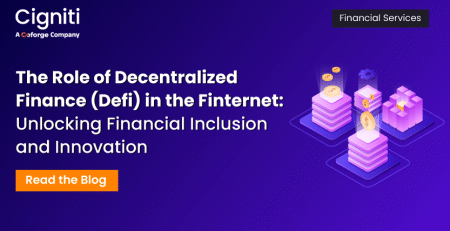The Finternet Revolution: Redefining the Future of Global Finance
|
Listen on the go!
|
The financial realm stands at the brink of a shift promising to alter how we handle money, carry out transactions, and oversee affairs. This transformation is encapsulated in the concept of “Finternet” – an innovative global financial ecosystem grounded in technologies like Blockchain, Decentralized Identity, and Smart Contracts. What exactly is the finternet, and why does it have the potential to revolutionize today’s financial landscape? Let’s delve into these queries and examine the impact of this emerging model.
What is the Finternet?
The Finternet is a blend of “Finance” and “internet” symbolizing the stage in the evolution of the worldwide financial structure. It is a decentralized financial network that functions seamlessly across various jurisdictions and financial services. Unlike finance systems often centralized under banks, governments, or financial bodies finternet operates based on decentralization principles, transparency, and security.
At its essence, Finternet utilizes technology to establish an immutable ledger for transactions. The decentralized ledger eliminates the necessity of intermediaries like banks or payment processors, enabling individuals and organizations to conduct transactions with each other. Moreover, Finternet integrates Decentralized Identity (DID) systems that allow users to securely manage their identities independently, further reducing dependence on authorities.
Essential Components of the Finternet
To comprehend how the Finternet will transform the sector, it is crucial to understand its elements and their interactions.
Blockchain Technologies
Immutable Ledger: The backbone of the finternet is blockchain technology. It offers a proof ledger that records all transactions in a transparent, auditable manner. This ledger is spread across a network of nodes, ensuring no single entity controls the system.
Smart Contracts: These contracts are self-execution with conditions directly coded into them. Contracts automate transaction execution, lessening the need for intermediaries and guaranteeing efficient agreement enforcement.
Decentralized Identity (DID)
Self-sovereign Identity: Did systems empower individuals and organizations to manage their digital identities without depending on centralized authorities? Users have control over their identity data, which they can selectively share with others to enhance privacy and security.
Interoperability: DIDs are created to work seamlessly across platforms and services within the Finternet, enabling users to maintain an identity across multiple fintech applications.
Decentralized Finance (DeFi)
Financial services without an intermediary: DeFi encompasses a range of services, including lending, borrowing, trading, and insurance. These services eliminate the need for intermediaries, providing a more accessible, transparent, and cost-effective alternative to traditional finance. The global reach of Defi services makes it accessible to anyone with an internet connection, making financial services reachable to underbanked populations worldwide.
Digital Currencies and Assets
Cryptocurrencies: Currencies such as Bitcoin and Ethereum play a role in the Finternet by facilitating decentralized, borderless transactions. These currencies operate independently of the banking systems, offering an alternative to fiat currencies.
Stablecoins and CBDCS: Stablecoins are tied to currencies. Central Bank Digital Currencies (CBDC) bridge the gap between traditional financial systems and the Finternet by providing a digital equivalent of fiat money.
How will the Finternet Transform the Financial Landscape?
The finternet is not an enhancement of current financial systems; it signifies a fundamental change in how financial services are provided and utilized. The Finternet is set to transform the landscape in several ways.
Decentralization of Financial Services
Empowering Users: One key impact of the Finternet is shifting power away from traditional financial institutions towards individual users. Through Decentralized Finance (DeFi) platforms, users can directly access services without relying on banks or other intermediaries. This change gives users authority over their assets and choices.
Cost Reduction: By eliminating intermediaries, the Finternet decreases the costs linked to financial transactions. Whether sending money internationally or obtaining a loan, users can anticipate reduced fees and quicker processing times.
Enhanced Financial Inclusion
The Finternet is globally inclusive, eliminating barriers to entry. This aspect is crucial for people and businesses in developing nations where traditional financial services may be scarce. The Finternet provides these populations with opportunities to engage in the economy and access credit facilities.
Support for the Unbanked: According to the World Bank Group, around 1.4 billion individuals do not have bank accounts as of 2021, restricting their access to financial services. The finternet, characterized by its structure and reliance on technologies, offers a pathway for these individuals to access banking, credit, and various financial services.
Enhanced Security and Trust
Secure Transactions: Integrating blockchain technology into the Finternet guarantees secure, transparent, and tamper-proof transactions. This feature plays a role in preventing fraud and establishing trust among transaction participants.
Privacy and Autonomy: DIDs give users control over their identity information, minimizing the risks of identity theft and unauthorized access to personal data. This autonomy enhances privacy levels, and fosters trust within the ecosystem.
Transparency and Accountability
Immutable Records: Every transaction conducted on the Finternet is securely recorded on a ledger, creating a transparent record. This transparency diminishes opportunities for corruption or fraudulent activities since all actions can be traced back.
Real-time Auditing: The capability to audit transactions promptly enhances accountability by ensuring financial institutions and entities comply with requirements.
Innovation and Adaptability
The Finternet is designed with modularity, enabling the development and integration of financial products and services. The flexibility of the Finternet encourages creativity, allowing for the creation of financial solutions that cater to the changing needs of users. The decentralized structure of the Finternet enables adjustments, advancements, regulatory shifts, and user preferences, ensuring its relevance and efficacy in a dynamic world.
Evolution in Regulation
RegTech Integrations: The Finternet will drive progress in Regulation Technology (RegTech), streamlining compliance processes through enhanced efficiency and automation. These evolutions will assist institutions in meeting obligations more effectively while reducing compliance costs.
Global standards: With the evolution of the Finternet, there is a potential for establishing standards for transactions, identity verification, and data security. These standards will promote consistency in regulations across regions, facilitating better international trade and finance.
Challenges and Considerations
Despite its advantages, the Finternet also poses challenges that must be resolved to ensure its implementation.
Regulation Ambiguity:
The decentralized nature of the Finternet creates complexities for regulators as they adapt existing frameworks to accommodate technologies and business models. Establishing Uniform regulations that safeguard users while fostering innovation is crucial.
Scalability and Acceptance:
To realize its potential, widespread adoption and scalability are essential for the success of the Finternet. Investing in infrastructure, educating users, and establishing standards across platforms are essential steps to take.
Security Concerns:
Although the Finternet improves security measures, it also introduces risks like smart contract vulnerabilities and cyberattacks. Implementing security protocols is crucial for maintaining trust in the system.
Conclusion
The Finternet presents a transformative vision for the future of finance. Utilizing decentralization technology and digital identity aims to build a secure, transparent, and inclusive financial environment. As the Finternet progresses, it is poised to become the cornerstone of an era of innovation that empowers individuals by reducing expenses and eliminating barriers to financial services.
Despite existing challenges, the potential advantages of the Finternet are too significant to overlook. With Individuals, businesses, and institutions embracing this model, the Finternet is set to revolutionize modern finance by creating opportunities and fostering growth in unprecedented ways.
Cigniti, a pioneer specializing in digital transformation, quality engineering, and software testing services, can significantly contribute to advancing Finternet projects and similar initiatives. By fostering innovation and upholding quality and security standards, Cigniti can serve as a trusted partner in the ecosystem, aiding in the development, testing, and implementation of financial technologies.
Leveraging its proficiency in digital transformation, cyber security, and automation, Cigniti stands out as a collaborator for organizations seeking to create and expand solutions within the Finternet landscape. This ensures that these innovative technologies realize their potential to reshape the financial sector as we know it.
Need help? Contact our Financial Services testing experts to learn more about the Finternet revolution and how it redefines global finance.





Leave a Reply